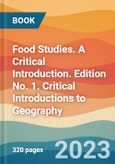This textbook will provide a broad introduction to food studies, highlighting topics and issues in food studies within geography and extending across wider social science. The subject matter covered will be highly relevant to North American audiences, at the same time the issues are transnational and a range of examples will ensure the book’s relevance to an international readership.
Food studies is a vibrant and growing interdisciplinary field, with deep roots not only in geography but also disciplines including sociology, anthropology, and philosophy. Over the past decade and a half, a critical approach has lent food studies an important edge that has gained wide attention. The cross-cutting nature of this book offers multiple entry points for engagement across the field and incorporates perspectives of inequality and social justice. In addition, it provides a hands-on, practice-oriented approach to the study of food designed to encourage students to think about the field as broadly as possible.
The main chapters will highlight a food-related “object” that will serve to ground theoretical concepts with real-life scenarios and examples. Each chapter will emphasize the “doing” of food studies, offering the reader opportunities to imagine and practice producing critical knowledge about food. The book will also highlight applied contexts and questions that are relevant not just to geography and food studies but also to public health and policy, applied nutrition and dietetics, environmental management, and other forms of professional practice for which food is a relevant topic of inquiry. In this way, the book will support course offerings and outcomes that are relevant to an array of different student backgrounds, interests, and career goals.
This text will emphasize and embrace the complexity of food systems and practices, offering a diverse and shifting set of critical explorations, including emergent and synthetic work in the field.








